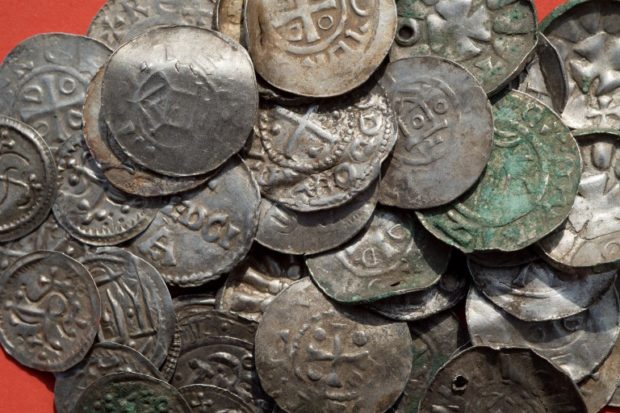
Saxon, Ottonian, Danish and Byzantine coins are pictured on a table in Schaprode, northern Germany on April 13, 2018. A 13-year-old boy and a hobby archaeologist have unearthed a “significant” trove in Germany which may have belonged to the legendary Danish king Harald Bluetooth who brought Christianity to Denmark. AFP
GERMANY – A 13-year-old boy and an amateur archaeologist have unearthed a “significant” treasure trove in Germany which may have belonged to the legendary Danish king Harald Bluetooth who brought Christianity to Denmark.
Rene Schoen and his student Luca Malaschnitschenko were looking for treasure using metal detectors in January on the northern island of Ruegen when they chanced upon what they initially thought was a worthless piece of aluminum.
But upon closer inspection, they realized that it was a shimmering piece of silver, German media reported.
A dig covering 400 square meters (4,300 square feet) that was finally started at the weekend by the regional archaeology service has uncovered a trove believed to be linked to the Danish king, a member of the Jelling dynasty, who reigned from around 958 to 986.
Braided necklaces, pearls, brooches, a Thor’s hammer, rings and up to 600 chipped coins were found, including more than 100 that date to Bluetooth’s era.
“This trove is the biggest single discovery of Bluetooth coins in the southern Baltic sea region and is therefore of great significance,” lead archaeologist Michael Schirren told national news agency DPA.
The oldest coin found in the trove is a Damascus dirham dating to 714 while the most recent is a penny dating to 983.
The find suggests that the treasure may have been buried in the late 980s — also the period when Bluetooth was known to have fled to Pomerania, where he died in 987.
He was forced to flee after a rebellion led by his son Sven Gabelbart.
“We have here the rare case of a discovery that appears to corroborate historical sources,” said archaeologist Detlef Jantzen.
‘Chaotic’ end to Harald’s reign
Bluetooth is credited with unifying Denmark. The Viking-born king also turned his back on old Norse religion and introduced Christianity to the Nordic country.
Bluetooth’s lasting legacy is found today in smartphones and laptops — the wireless Bluetooth technology is named after him, and the symbol is composed of the two runes spelling out his initials R. B.
Brian Patrick McGuire, professor emeritus at Roskilde University in Denmark, said it was the Thor’s hammer that made this find particularly interesting.
“There’s no proof that these things belonged to Harald Bluetooth. But what we can say is they show the tremendous wealth of the Jelling dynasty,” he told AFP.
The end of Harald’s reign was “very chaotic,” McGuire said.
“Things were so unstable that very wealthy men or women from his court felt obliged to bury their coins and jewelry. Usually, treasures are left behind by people who hope to retrieve them when things get better, as an act of faith in better times,” the expert said.
Whatever the market value of the treasure turns out to be, the fine has provided an invaluable source of information for researchers who had very little written material covering this troubled period, McGuire added. /cbb

